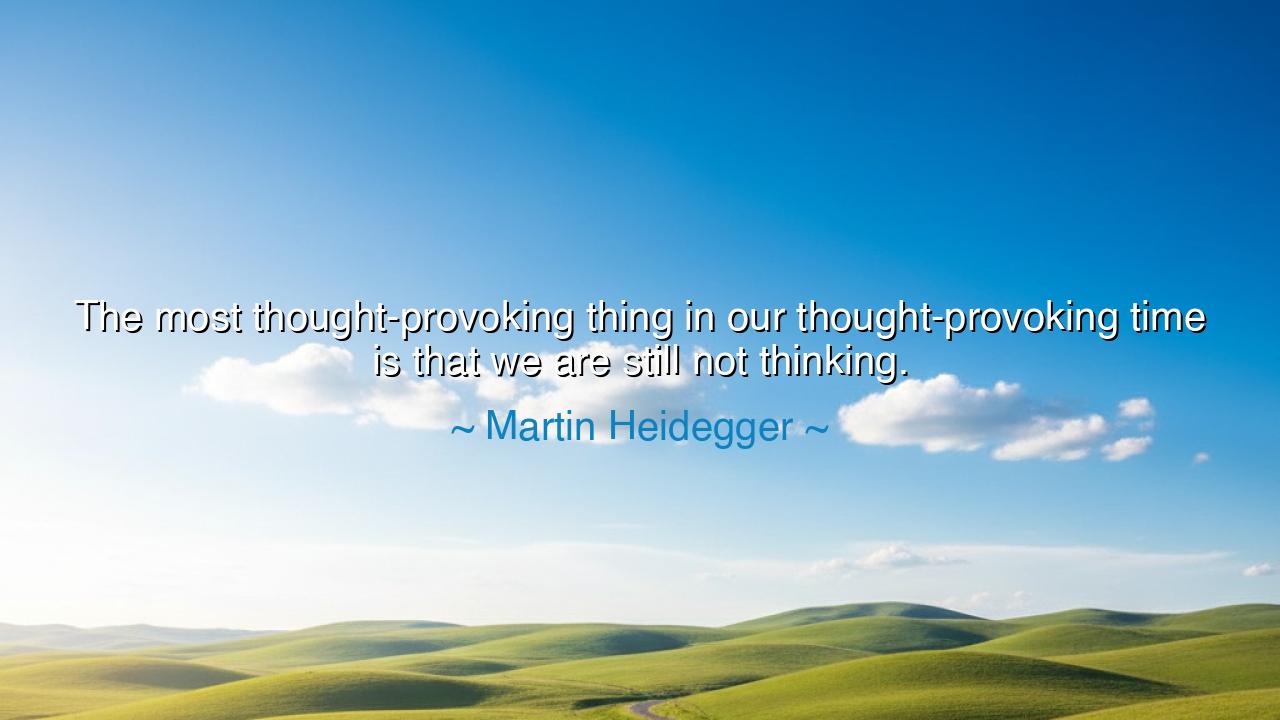
The most thought-provoking thing in our thought-provoking time
The most thought-provoking thing in our thought-provoking time is that we are still not thinking.






The words of Martin Heidegger, “The most thought-provoking thing in our thought-provoking time is that we are still not thinking,” strike like a riddle from an ancient oracle, heavy with paradox yet radiant with truth. Spoken by a philosopher who sought to awaken mankind from its slumber, these words reveal the great tragedy of the modern age: in a world flooded with information, filled with questions, discoveries, and debates, man has mistaken the appearance of thought for the essence of thinking. Heidegger calls us to recognize that though we are surrounded by noise and analysis, the deeper art of contemplation—the stillness that births true wisdom—remains neglected.
At its heart, this quote separates mere calculation from genuine reflection. In our age, men and women are skilled at solving problems, designing machines, and producing endless commentary. But Heidegger warns that this is not the same as thinking. True thinking is not the endless chatter of the mind, nor the manipulation of facts—it is the ability to dwell on the meaning of existence, to question what it means to be, to ask the questions that lie beneath all others. To live without such reflection is to move restlessly across the surface of life, never touching its depths.
The origin of this teaching lies in Heidegger’s lifelong struggle with modernity. Living in a century marked by world wars, rapid industrialization, and the rise of technology, he saw humanity dazzled by progress yet increasingly estranged from itself. He believed that in its pursuit of efficiency and control, mankind had forgotten to ask the essential questions: Who are we? What is being? What does it mean to dwell upon this earth? Thus, his words are both an indictment and an invitation—an indictment of a society that confuses distraction with knowledge, and an invitation to rediscover the silence and seriousness of true thought.
History itself gives us examples of the danger Heidegger describes. In the years leading up to the Second World War, nations were brimming with ideas—political theories, economic plans, technological inventions—yet they failed to think deeply about their moral meaning. The rise of Nazism was not due to a lack of intellect, but to a lack of genuine reflection on dignity, humanity, and truth. Men were thought-filled, but not thought-ful. And in this failure to truly think, horrors were born. Heidegger, who lived through this darkness, knew too well the cost of a world rich in calculation yet poor in wisdom.
The deeper wisdom of this quote is that thought is not the same as awareness. One may be surrounded by books and machines, yet remain asleep to the deeper mysteries of life. True thinking is not shallow consumption but an act of reverence—a willingness to linger with questions without rushing to easy answers. It is in such silence that the soul begins to see beyond appearances and into truth. Without this, all our cleverness becomes hollow, and our age, however advanced, remains lost.
To the seekers of wisdom, let this teaching be etched into your hearts: do not confuse busyness of the mind with depth of the soul. Make time to stop, to question, to wonder. Ask not only, “How can this be done?” but also, “Should it be done?” Ask not only, “What do I know?” but also, “What does it mean to know?” Such questions are the beginning of true thinking, the fire that warms the human spirit and keeps it from the cold machinery of a life without reflection.
The practical lesson is this: set aside moments each day for stillness. Turn off the noise, put away the distractions, and allow yourself to dwell deeply on a single question that matters. Read not only to consume, but to ponder. Speak not only to answer, but to listen. And above all, resist the temptation to treat life as a problem to be solved rather than a mystery to be lived. For in the act of thinking, truly thinking, you will rediscover both yourself and the meaning of your place in the world.
Thus, let Heidegger’s words echo as both rebuke and hope: we live in a time of endless thought, yet not enough true thinking. But if we awaken, if we dare to pause, to question, to listen to the silence beneath the noise, we may yet recover the ancient art of contemplation. And in that recovery lies the possibility of wisdom, peace, and a future worthy of mankind.






AAdministratorAdministrator
Welcome, honored guests. Please leave a comment, we will respond soon